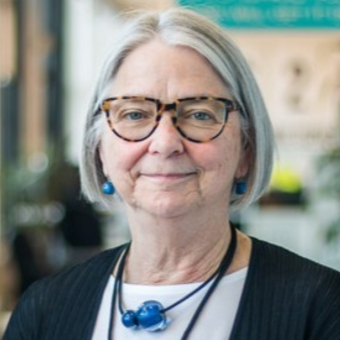Joanne Nicholson, Ph.D.
 From LinkedIn to online portfolios, it seems that today’s workforce has a range of technology platforms to choose from when it comes to finding satisfying work and growing their careers. However, one segment of the workforce has been systematically left behind, at least till now: neurodivergent workers. Autistic workers in particular face unique professional challenges in settings that require so-called “soft skills,” which emphasize social interaction. And with soft skills increasingly seen as a competitive advantage, that means solutions are needed - for the worker and in the workplace. Prof. Joanne Nicholson, a clinical and research psychologist and Professor of the Practice at the Heller School for Social Policy and Management, saw this gap in support for workers with mental health conditions and those who are neurodivergent, especially those in the early stages of their careers. Her solution was to build an app, based on the latest research, that would help employees manage such soft skills as social interaction, planning, and emotional intelligence. The app, WorkingWell, aims to be a suite of digital tools to improve work satisfaction and performance for neurodivergent workers. By providing widely-recognized productivity tools such as goalsetting, reminders, and self-reflection, WorkingWell adapts digital tools used by many professionals to the unique needs of the estimated 20% of American adults who are neurodivergent. Joanne brought the idea to Brandeis Innovation on the recommendation of a colleague. Meeting with Associate Provost for Innovation, Rebecca Menapace,she learned about the many supports that the virtual incubator program offers faculty. Joanne and her team participated in the National Science Foundation I-Corps program, which helps researchers identify the
From LinkedIn to online portfolios, it seems that today’s workforce has a range of technology platforms to choose from when it comes to finding satisfying work and growing their careers. However, one segment of the workforce has been systematically left behind, at least till now: neurodivergent workers. Autistic workers in particular face unique professional challenges in settings that require so-called “soft skills,” which emphasize social interaction. And with soft skills increasingly seen as a competitive advantage, that means solutions are needed - for the worker and in the workplace. Prof. Joanne Nicholson, a clinical and research psychologist and Professor of the Practice at the Heller School for Social Policy and Management, saw this gap in support for workers with mental health conditions and those who are neurodivergent, especially those in the early stages of their careers. Her solution was to build an app, based on the latest research, that would help employees manage such soft skills as social interaction, planning, and emotional intelligence. The app, WorkingWell, aims to be a suite of digital tools to improve work satisfaction and performance for neurodivergent workers. By providing widely-recognized productivity tools such as goalsetting, reminders, and self-reflection, WorkingWell adapts digital tools used by many professionals to the unique needs of the estimated 20% of American adults who are neurodivergent. Joanne brought the idea to Brandeis Innovation on the recommendation of a colleague. Meeting with Associate Provost for Innovation, Rebecca Menapace,she learned about the many supports that the virtual incubator program offers faculty. Joanne and her team participated in the National Science Foundation I-Corps program, which helps researchers identify the
commercial potential for their inventions, understand their target market, and build a business model. They also received funding from Sprout, the Innovation Center’s accelerator for bench research. Through both programs, the team received mentorship, training, and support that helped them explore pathways to launching WorkingWell as an app available to the public.
From there, WorkingWell went beyond the boundaries of Brandeis to two important external programs that Brandeis Innovation has strong relationships with: MassChallenge and the national I-Corps program. MassChallenge, one of the world’s most prestigious startup accelerators, has long partnered with Brandeis, accepting many of our leading innovators into their startup competition. WorkingWell participated in MassChallenge’s 2020 healthtech cohort, gaining new industry connections. Later, they were accepted into the NSF I-Corps National program, a rigorous 7-week platform for launching the nation’s most innovative universityborn technologies. Working alongside startups from MIT
Cornell, and more, they conducted customer discovery to learn more about the needs of workers and workforce development programs. This helped them further expand WorkingWell’s reach, impact, and usefulness to its target communities.
At the same time, WorkingWell won a partnership with the Massachusetts Department of Developmental Services (DDS) to bring the app to local workplaces. That led to the development of a second prototype of the app, this time focused solely on the needs of autistic workers. With each step, Joanne and her team have refined their idea, strengthening its social impact potential. WorkingWell is well on its way to becoming a go-to app for neurodivergent Americans to excel and feel supported in the workplace.
“Thanks to the Brandeis Innovation Center, we have been able to look at our invention in new ways that we had never thought of,” says Joanne. “These programs have really helped us to learn the business side of science. It’s not enough to have a great idea. You also need to have a path to bring it to market, with the right tools to approach your research from the perspective of your customers. Brandeis Innovation gave us that toolset.” — Joanne Nicholson, Ph.D